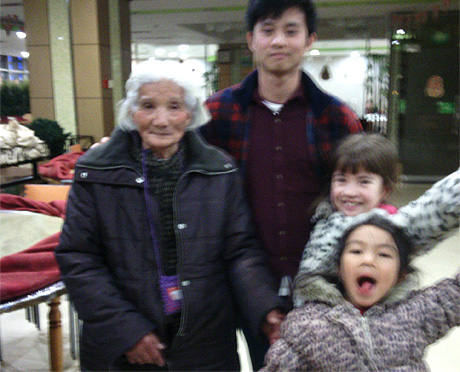My Grandmother's Grandmother
Piecing together the past through memory – by Luhai Liang
On the balcony, where she keeps the livestock, my grandmother is methodically murdering a duck. In her left hand she grabs the duck's serpentine neck, shiny white in the sun, in a hard grip. With her other hand she reaches for a dull knife and cuts the duck's throat. I watch the duck as it lays in a large plastic bowl, its eyes in passive shock, while my grandmother pours hot water onto its body to soften the skin, ready for plucking.
I was eight or ten when this happened, on a visit to China. My mum and I had flown from England back to Guilin, my birthplace and Chinese hometown. I watched the process silently, in detail. I was used to seeing animals being killed in front of my eyes, for dinner.
Guilin is a southern Chinese city, with limestone hills that rise molehill-like in the rivers and rice fields. I was five when I left for England, which became my home, but my grandmother on my mother's side had raised me for a while in my infancy. Yet how much do I really know about her?
One of my favorite questions to ask a grandmother is what they remember of their own grandmothers. The question serves three purposes. First of all, flattery, as you've conceived of the possibility that someone elderly was once young. Second, it stokes a memory of youth, and in so doing allows them to imagine being young again. Finally, it connects you to your elderly relative, who lived in a time utterly inconceivable to you.
My grandmother is 80. Her memories of her grandmother’s memories of childhood are already reaching back from 2014 to, say, 1884. If both your grandmas had long lives, you could be connected, in living memory, to the 1840s. To put that into perspective, in the 1840s Abraham Lincoln was a junior congressman, the end of the second Opium War had led to the cession of Hong Kong to Britain, and kerosene was invented.
In China, my grandmother was living in a village in rural Hunan province, a southern province from which she would eventually flee, with my grandfather, when the Japanese invaded and started to move south in the Second World War.
To imagine that far into the past is hard. You can't do it without perceiving how time passes in the memory as scenes and events. You grasp slight clues, inadequate words, but they linger anyway – like the story grandmother told me when I was eating watermelon once, that the seeds would grow into trees in my stomach.
My grandmother is illiterate and uneducated, as are many women from that period. She is very small, wears simple shirts and sweaters, and was, I've heard tell, quite the pretty face when younger, although there is no photo to prove it.
On my grandmother’s 80th birthday we had a big dinner celebration at a local restaurant, with relatives taking up four large round tables. Her brothers had traveled all the way from their farms in Hunan to attend. I had never seen them before, nor had any of my relatives ever mentioned their existence. My grandmother, despite being their elder sister, could not ask them to come to the celebration directly – this was not proper gender protocol for their generation, apparently. She had to invite them through someone else, though I didn't discover quite how.
They seemed honest men, with big farmer hands, stocky bodies and deep, browned skin. My stepfather is English, my uncle (by marriage to my aunty) is British Indian and my half sister is mixed race, but they all got along grand. It's jarring if you think about the cultural, geographical and age differences. But it's wrong to assume that rural people from a distant country are in any way unworldly.
It was a feast of duck, chicken, pork and fish, with red wine, rice wine and beer. There was much toasting and running around, meeting and greeting. My grandmother seemed reserved though, perhaps because of modesty, perhaps in deference to her brothers.
80 is a milestone, and worthy of gathering family members together. My grandmother was my sole carer for a time, and a deep bond formed between us when I was a child. But the bond slackened as I grew older. There are younger members in the family now, and she doesn’t see me as a child anymore. It's a necessary evolution, like learning how to sail on a sea that will eventually set you apart.
I didn't learn much about my grandmother's grandmother in the end. My grandmother didn’t have much to say about her, and my Chinese isn’t especially fluent. But I gathered that she was a simple woman, with a simple life and simple tasks. It’s difficult to imagine how differently women were regarded in those times.
My family says my grandmother won't last much longer. She has told my mother that she often has dreams about death. According to my mother, this is how you know when an old person and death are due.
I want to ask her about so many things, to chronicle her life. Yet somehow it seems impertinent to ask, to interview your own relatives. But I know I will realise the loss when she's gone. The past will no longer be available, and the story of my family will be missing a chapter.
I will miss my grandmother, and the childhoods her memories keep alive – her mother's, her own, my mother's, and mine.
•
Luhai Liang is a freelance writer in Beijing. Follow him on Twitter here


















